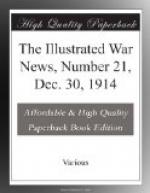Christmas celebrations in the Navy were naturally curtailed this year, but even in time of war the festival is observed to some extent, under the limitations caused by the necessity of being ready for immediate action. That the Navy did not allow Christmas festivities to interfere with duty is shown by the brilliant air-raid on Cuxhaven on Christmas morning. The Grand Fleet which keeps its silent watch on the seas, under Admiral Jellicoe, did not, we may be sure, relax any of its vigilance. One of the Christmas customs in the Navy is to decorate the mastheads with holly, mistletoe, or evergreens. The mess-room tables are also decorated, and the officers walk in procession through the messes, the Captain sampling the fare.—[Photos. by Newspaper Illustrations and Alfieri.]
_______________________________________________________
___________________ 4—THE ILLUSTRATED WAR NEWS, DEC. 30, 1914.—[Part 21]
of our submarines in the Dardanelles, had simply been the victim of a “leak”; but so serious was this little “rift within the lute” that its author, Lieut.-Commander Holbrook, R.N., was awarded a V.C. for his splendid deed of daring—a very different kind of act from the German bombardment of undefended towns on our East Coast, which caused our First Lord of the Admiralty to write to the Mayor of Scarborough—and his words deserve to be here repeated and recorded—that “nothing proves more plainly the effectiveness of British naval pressure than the frenzy of hatred aroused against us in the breasts of the enemy.... Their hate is the measure of their fear.... Whatever feats of arms the German Navy may hereafter perform, the stigma of the baby-killers of Scarborough will brand its officers and men while sailors sail the seas.”
[Illustration: A GERMAN ISLAND ADDED TO THE EMPIRE BY THE AUSTRALIAN FORCES: READING THE BRITISH PROCLAMATION AT RABAUL, NEU POMMERN.
The Australian Squadron arrived at Herbertshoehe, Neu Pommern, on September 11. After some fighting, the Germans surrendered, and, two days later, the Union Jack was hoisted at Rabaul, the German capital. The proclamation was read by Major Francis Heritage (facing Colonel W. Holmes, the central figure in the photograph). For the benefit of the natives an address was given in amusing “pidgin” English (see the “Times,” November 16). Neu Pommern (formerly New Britain) is just east of New Guinea.]
Other attempts at “frightful frightfulness” on the part of these “baby-killers” were a couple of aeroplane raids—of which the base was probably Ostend—carried out on Christmas Eve and Christmas Day respectively—against Dover and Sheerness. It must be owned that they were decidedly daring, yet in the nature of damp-squib affairs, as it turned out. In the case of Dover, the bomb dropped was probably intended for the Castle—a




